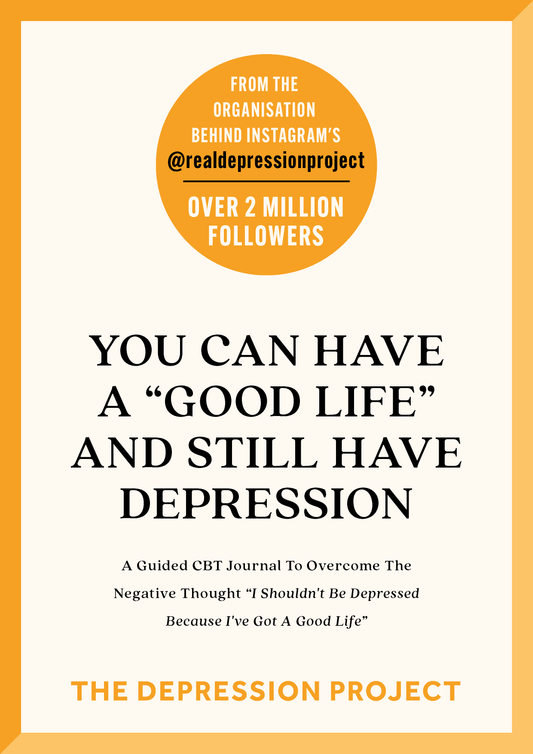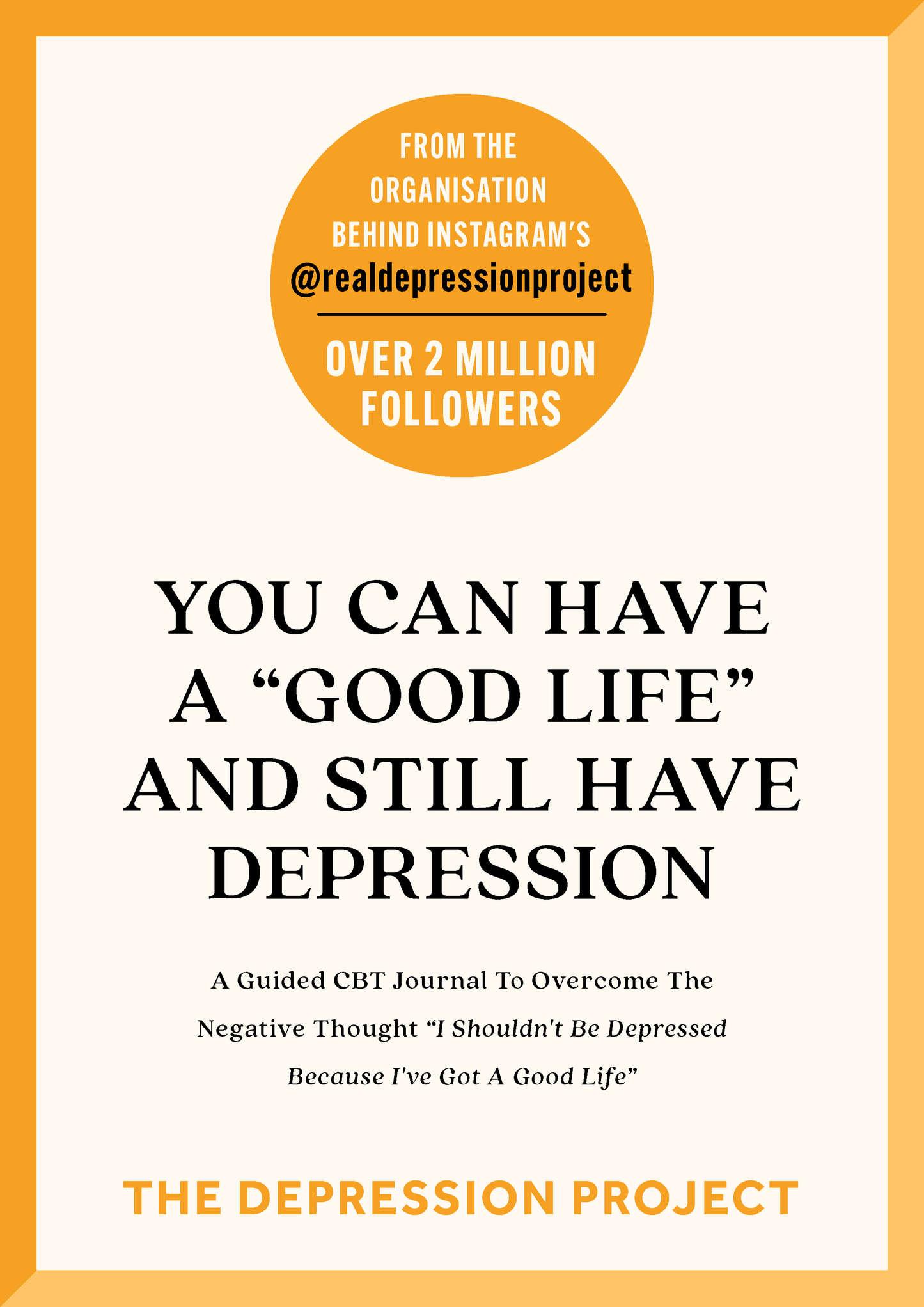
Do you ever think that you "shouldn't be depressed" because you've "got a good life"?
In 2021, The Depression Project posed a question to our 3,000,000+ person social media community:
In what ways can depression cause you to feel ashamed?
Thousands of people responded, and one of the most common sources of “depression shame” that people mentioned was along the lines of:

Unfortunately, this can indeed be a very natural source of shame for people with depression – which of course, does nothing but compound what’s already an extremely challenging, debilitating illness to deal with.
However, the judgmental thought “I shouldn’t be depressed because I’ve got a good life” is just that – a judgmental thought – as opposed to a fact. And so, we’ve put together this cognitive behavioural therapy-based journal, in order to help you:
- See for yourself that this judgmental thought is not true;
- Let go of the shame that it causes you to feel.
Here’s A Breakdown Of Exactly What This Journal Will Cover
PART 1: Understanding The Five Different Aspects Of Depression, Which Explain Why ANYONE Can Struggle With This Illness (Including People Who “Have A Good Life”)
In the first part of this journal:
- Firstly, we will explain in detail the five different aspects of depression (as based on the cognitive behavioural therapy model) - i.e. the thinking patterns which can fuel depression; the emotions which can fuel depression; the behaviours which can fuel depression; the physical factors which can fuel depression; and the situational factors which can fuel depression (such as, for example, being in a toxic relationship, financial difficulties, serious physical illness or injury, and/or going through a traumatic experience).
- Secondly, we will explain why if you think “I shouldn’t be depressed because I’ve got a good life”, then what it usually means is that there are unlikely any obvious, easily-identifiable causes of depression in your life. Or, to put it another way, it usually means that at least some (or perhaps all) of the “situational factors” that sometimes contribute to other people’s depression are not a contributing factor to your depression (for example, you may not have any financial difficulties; you may live in a comfortable home; you may be in good health; and you may be surrounded by loving, supportive family and friends).
- Thirdly, we’ll explain why, since depression can have many, many, many contributing factors, and since only a subset of these contributing factors are situational in nature, it means that absolutely ANYBODY can have depression – even people who have a “good life” with respect to a variety of situational factors.
- Fourthly, through a variety of guided journal prompts, we’ll help you think about and identify the thinking patterns, emotions, behaviours and/or the physical factors that are currently contributing to your depression (in addition to any situational factors which may not be immediately obvious). This is something that we believe is extremely, extremely important, because once you understand what the contributing factors to your depression actually are - and that these contributing factors can be present even when you have a “good life” situationally - then among other benefits, it can help you take a big step towards letting go of the judgmental thought “I shouldn’t be depressed because I’ve got a good life”.
PART 2: Cognitive Behavioural Therapy Techniques To Help You Let Go Of The Judgmental Thought “I Shouldn’t Be Depressed Because I’ve Got A Good Life” Anytime It Is Triggered
Once you’ve completed Part 1 of this journal, then like we’ve said, it can help you take a big step towards letting go of the judgmental thought “I shouldn’t be depressed because I’ve got a good life”. And, as a result:
- Moving forwards, you are likely to think this judgmental thought less frequently;
- Moving forwards, any time you do think this judgmental thought, it is likely to not be as strong of a judgmental thought as it was previously, nor cause you to feel as ashamed as it used to.
However, there may still be times when you think this judgmental thought, which is why in Part 2 of this journal, we’ll share with you a wide variety of tried, tested, cognitive behavioural therapy techniques to help you let go of it anytime it is triggered.
Additionally, each technique we share with you will also be accompanied by one or more guided journal prompts - in order to help you think about how you could implement that technique as effectively as possible.
FAQ #1: Why should I be confident this journal will help me?
This journal is grounded in cognitive behavioural therapy - which in case you don't know, is a leading form of treatment for depression, anxiety, panic attacks, phobias, personality disorders, and a wide range of other mental health issues.
Additionally, this journal is also written with the warmth, care, encouragement and insight that, with 3,000,000+ followers on social media, The Depression Project has become renowned for :)
FAQ #2: What format does this journal come in?
This journal is available in two different formats for you to choose from:
- PDF - which you will be able to download instantly after purchase, and then print out at your home, office or local printer.
- Paperback (if you live in the US or Canada) - which will be delivered to you within 4-8 business days. Shipping costs are US$7.95 within the US and CAD$14 within Canada. This shipping cost is a flat rate, so whether you order one journal, or multiple journals, the shipping cost will be the same (if you would like to, you'll find the option to add one or more other journals to your cart below so that you can save on shipping). Once your order has been shipped, you will be emailed a number so that you can track it.
FAQ #3: What if I give this journal a try but I don't like it?
We're extremely, extremely confident that you're going to find this journal immensely helpful. But, just in case you don't, the PDF version of this journal comes with a 60 Day, No-Questions-Asked, 100% Moneyback Guarantee!

If you have any questions about this journal, then please feel free to click here and contact us so that someone from our friendly team can answer them for you :)
Otherwise, we hope you choose to get this journal, because we know that you're going to find it really, really helpful!
All our love,
The Depression Project Team.
Format Options

